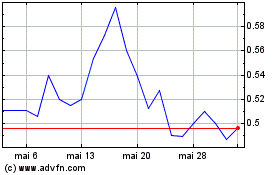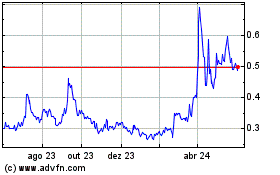IGC Pharma Announces TGR-63 Reduces Agitation in Alzheimer's Mouse Model
01 Fevereiro 2024 - 11:20AM
Business Wire
- The Company is targeting a Phase 1 trial in
2024 -
IGC Pharma, Inc. ("IGC Pharma," "IGC," or the "Company") (NYSE
American: IGC) today announced additional positive results of
preclinical studies investigating the Company's newly announced
therapeutic candidate, TGR-63, a potential treatment for
Alzheimer's disease. Previously disclosed results demonstrate that
TGR-63 may successfully alleviate plaque burden in Alzheimer's cell
lines and animal models. Plaques are a key hallmark and therapeutic
target of Alzheimer's disease.
"While we continue to progress our Phase 2b trial of IGC-AD1 as
a treatment for agitation in dementia due to Alzheimer's, we are
excited by the preclinical results of TGR-63, in particular the
profound impact of the drug on plaques and on reducing anxiety in a
transgenic Alzheimer's mouse model. In line with IGC Pharma's
artificial intelligence and machine learning ("AI/ML") initiatives,
we plan to leverage cutting-edge AI/ML tools for studying TGR-63's
toxicology and protein interactions. By harnessing the power of
AI/ML, we expect to accelerate the journey of TGR-63 from
preclinical to patient care. We continue progressing IGC-AD1 and
TGR-63 enthusiastically and anticipate clinical milestone updates
throughout 2024 from our strengthened AD pipeline," said CEO Ram
Mukunda.
TGR-63 is a patent pending molecule designed to disrupt the
structure of the amyloid beta ("Aβ") peptide, one of the key
hallmarks of Alzheimer's. TGR-63 targets plaques by addressing the
misfolding and aggregation of amyloid-β peptides, specifically the
toxic Aβ42 aggregation species associated with neuronal toxicity
and cognitive decline. Preclinical investigations also indicate a
recovery of behavioral functions in an animal model of Alzheimer's,
suggesting that TGR-63 could possibly be used as a treatment for
anxiety in human Alzheimer's.
The preclinical trial was conducted on APP/PS1 (transgenic) mice
that are genetically modified to carry mutations of the Amyloid
Precursor Protein (APP) gene that lead to the production of a
specific form of Aβ peptide, a key component of amyloid plaque in
the brains of individuals with Alzheimer's.
During the investigation, two groups of APP/PS1 mice undertook
an Open-Field ("OF") test, a behavioral assessment designed to
measure anxiety-like behavior, stress and coping responses, and
emotional state, among others, in rodent models.
The mice in the APP/PS1 group that received TGR-63 treatment
showed significant improvements in their emotional well-being and
anxiety levels compared to the group that didn't receive treatment.
A series of tests were used to measure these improvements. First,
in the Open-Field (OF) test, the treated mice displayed a 43%
reduction in their overall movement within the test area, which was
highly statistically significant (p<.0001). They also showed a
59% reduction in movement within the central zone of the test area
(p<.01). Additionally, in a more specialized analysis called the
Center Zone Exploration (CZE) Analysis, the TGR-63 treated group
exhibited a 55% improvement compared to the untreated group
(p<.05). The results from these multiple tests indicate that
TGR-63 treatment helped normalize emotional and behavioral
responses in our Alzheimer's mouse model, reinforcing its potential
as a promising treatment.
About IGC Pharma Inc. (dba IGC):
IGC Pharma is pursuing innovative solutions to fight Alzheimer's
disease and related challenges. IGC Pharma's portfolio comprises
five assets, all with a singular mission - to transform the
landscape of Alzheimer's treatment. IGC-AD1 and LMP target
neuroinflammation, Aβ plaques, and neurofibrillary tangles. IGC-AD1
is currently in a Phase 2b clinical trial for agitation in dementia
due to Alzheimer's (clinicaltrials.gov, NCT05543681). TGR-63
targets Aβ plaque to disrupt the progression of Alzheimer's
disease. IGC-M3 targets the inhibition of Aβ plaque aggregation
with the potential to create a profound impact on early-stage
Alzheimer's. IGC-1C targets tau and neurofibrillary tangles in a
forward-thinking approach to Alzheimer's therapy. In parallel, IGC
Pharma is at the forefront of Generative AI development, with
projects including clinical trials, early detection of Alzheimer's,
and drug interactions with cannabinoids.
Forward-Looking Statements:
This press release contains forward-looking statements. These
forward-looking statements are based largely on IGC Pharma's
expectations and are subject to several risks and uncertainties,
certain of which are beyond IGC Pharma's control. Actual results
could differ materially from these forward-looking statements as a
result of, among other factors, the Company's failure or inability
to commercialize one or more of the Company's products or
technologies, including the products or formulations described in
this release, or failure to obtain regulatory approval for the
products or formulations, where required, or government regulations
affecting AI or the AI algorithms not working as intended or
producing accurate predictions; general economic conditions that
are less favorable than expected; the FDA's general position
regarding cannabis- and hemp-based products; and other factors,
many of which are discussed in IGC Pharma's U.S. Securities and
Exchange Commission ("SEC") filings. IGC Pharma incorporates by
reference the human trial disclosures and Risk Factors identified
in its Annual Report on Form 10-K filed with the SEC on July 7,
2023, as if fully incorporated and restated herein. Considering
these risks and uncertainties, there can be no assurance that the
forward-looking information contained in this release will
occur.
View source
version on businesswire.com: https://www.businesswire.com/news/home/20240201187807/en/
Investors IMS Investor Relations Walter Frank
igc@imsinvestorrelations.com (203) 972-9200 Media JVPRNY
Janet Vasquez jvasquez@jvprny.com (212) 645-5498
IGC Pharma (AMEX:IGC)
Gráfico Histórico do Ativo
De Dez 2024 até Jan 2025

IGC Pharma (AMEX:IGC)
Gráfico Histórico do Ativo
De Jan 2024 até Jan 2025
